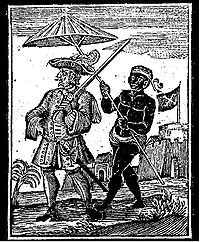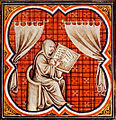Portal:Biography
The Biography Portal
A biography, or simply bio, is a detailed description of a person's life. It involves more than just basic facts like education, work, relationships, and death; it portrays a person's experience of these life events. Unlike a profile or curriculum vitae (résumé), a biography presents a subject's life story, highlighting various aspects of their life, including intimate details of experience, and may include an analysis of the subject's personality.
Biographical works are usually non-fiction, but fiction can also be used to portray a person's life. One in-depth form of biographical coverage is called legacy writing. Works in diverse media, from literature to film, form the genre known as biography.
An authorized biography is written with the permission, cooperation, and at times, participation of a subject or a subject's heirs. An unauthorized biography is one written without such permission or participation. An autobiography is written by the person themselves, sometimes with the assistance of a collaborator or ghostwriter. (Full article...)
Featured biographies –
Overcoming doubts about the possibility of playing again, Keenor returned to the game with Cardiff as they embarked on the most successful period in their history. They won promotion to the First Division one season after joining the Football League in 1920. Keenor helped the club to the 1925 FA Cup Final, in which Cardiff suffered a 1–0 defeat to Sheffield United. In 1926, he replaced the departing Jimmy Blair as club captain, leading the team to success in the 1927 FA Cup Final later in the season, in which they defeated Arsenal 1–0. Their triumph remains the only time the competition has been won by a team based outside England. (Full article...)
Meshuggah (/məˈʃʊɡə/) is a Swedish extreme metal band formed in Umeå in 1987. Since 2004, the band's lineup consists of founding members Jens Kidman (lead vocals) and Fredrik Thordendal (lead guitar), alongside rhythm guitarist Mårten Hagström, drummer Tomas Haake and bassist Dick Lövgren. Since its formation, the band has released nine studio albums, six EPs and eight music videos. Their latest studio album, Immutable, was released in April 2022 via Atomic Fire Records.
Meshuggah has become known for their innovative musical style and their complex, polymetered song structures and polyrhythms. They rose to fame as a significant act in extreme underground music, became an influence for modern metal bands, and gained a cult following. The band was labelled as one of the ten most important hard rock and heavy metal bands by Rolling Stone and as the most important band in metal by Alternative Press. In the late 2000s, the band was an inspiration for the djent subgenre. (Full article...)
Roekiah (Perfected Spelling: Rukiah; 31 December 1917 – 2 September 1945), often credited as Miss Roekiah, was an Indonesian kroncong singer and actress. The daughter of two stage performers, she began her career at the age of seven; by 1932 she had become well known in Batavia, Dutch East Indies (now Jakarta, Indonesia), as a singer and stage actress. Around this time she met Kartolo, whom she married in 1934. The two acted in the 1937 hit film Terang Boelan, in which Roekiah and Rd Mochtar played young lovers.
After the film's commercial success, Roekiah, Kartolo, and most of the cast and crew of Terang Boelan were signed to Tan's Film, first appearing for the company in their 1938 production Fatima. They acted together in two more films before Mochtar left the company in 1940; through these films, Roekiah and Mochtar became the colony's first on-screen couple. Mochtar's replacement, Rd Djoemala, acted with Roekiah in four films, although these were less successful. After the Japanese invaded the Indies in 1942, Roekiah took only one more film role before her death; most of her time was used entertaining Japanese forces. (Full article...)
Sulayman ibn Abd al-Malik ibn Marwan (Arabic: سُلَيْمَان ٱبْن عَبْد الْمَلِك ٱبْن مَرْوَان, romanized: Sulaymān ibn ʿAbd al-Malik ibn Marwān, c. 675 – 24 September 717) was the seventh Umayyad caliph, ruling from 715 until his death. He was the son of Caliph Abd al-Malik ibn Marwan (r. 685–705) and Wallada bint al-Abbas. He began his career as governor of Palestine, while his father Abd al-Malik (r. 685–705) and brother al-Walid I (r. 705–715) reigned as caliphs. There, the theologian Raja ibn Haywa al-Kindi mentored him, and he forged close ties with Yazid ibn al-Muhallab, a major opponent of al-Hajjaj ibn Yusuf, al-Walid's powerful viceroy of Iraq and the eastern Caliphate. Sulayman resented al-Hajjaj's influence over his brother. As governor, Sulayman founded the city of Ramla and built the White Mosque in it. The new city superseded Lydda as the district capital of Palestine. Lydda was at least partly destroyed and its inhabitants may have been forcibly relocated to Ramla, which developed into an economic hub, became home to many Muslim scholars, and remained the commercial and administrative center of Palestine until the 11th century.
After acceding as caliph, Sulayman dismissed his predecessor's governors and generals. Many had been handpicked by al-Hajjaj and had led the war efforts which brought the Caliphate to its greatest territorial extent. Among them were the conqueror of Transoxiana (Central Asia), Qutayba ibn Muslim, who was killed by his own troops in an abortive revolt in anticipation of his dismissal, and the conqueror of Sind (the western Indian subcontinent), Muhammad ibn al-Qasim, who was executed. In the west, Sulayman deposed Musa ibn Nusayr, the conqueror of the Iberian Peninsula (al-Andalus) and governor of Ifriqiya (central North Africa), and had his son Abd al-Aziz, governor of al-Andalus, assassinated. Although he continued his predecessors' militarist policies, expansion largely stopped under Sulayman, partly due to effective resistance along the Central Asian frontiers and the collapse of Arab military leadership and organization there after Qutayba's death. Sulayman's appointee over the eastern Caliphate, his confidant Yazid, invaded the southern Caspian coast in 716, but withdrew and settled for a tributary arrangement after being defeated by the local Iranian rulers. Sulayman intensified the war with the Byzantine Empire, the primary focus of his war efforts, culminating in the 717–718 siege of Constantinople, which ended in a disastrous Arab defeat. (Full article...)
Michael "Mike" Collins (October 31, 1930 – April 28, 2021) was an American astronaut who flew the Apollo 11 command module Columbia around the Moon in 1969 while his crewmates, Neil Armstrong and Buzz Aldrin, made the first crewed landing on the surface. He was also a test pilot and major general in the U.S. Air Force Reserve.
Born in Rome, Italy, where his father was serving as the U.S. military attaché, Collins graduated in the Class of 1952 from the United States Military Academy. He followed his father, brother, uncle, and cousin into the military. He joined the United States Air Force, and flew F-86 Sabre fighters at Chambley-Bussières Air Base, France. He was accepted into the U.S. Air Force Experimental Flight Test Pilot School at Edwards Air Force Base in 1960, also graduating from the Aerospace Research Pilot School (Class III). (Full article...)
Yazid ibn Mu'awiya ibn Abi Sufyan (Arabic: يزيد بن معاوية بن أبي سفيان, romanized: Yazīd ibn Muʿāwiya ibn ʾAbī Sufyān; c. 646 – 11 November 683), commonly known as Yazid I, was the second caliph of the Umayyad Caliphate, ruling from April 680 until his death in November 683. His appointment by his father Mu'awiya I (r. 661–680) was the first hereditary succession to the caliphate in Islamic history. His caliphate was marked by the death of Muhammad's grandson Husayn ibn Ali and the start of the crisis known as the Second Fitna.
During his father's caliphate, Yazid led several campaigns against the Byzantine Empire, including an attack on the Byzantine capital, Constantinople. Yazid's nomination as heir apparent in 676 CE (56 AH) by Mu'awiya was opposed by several Muslim grandees from the Hejaz region, including Husayn and Abd Allah ibn al-Zubayr. The two men refused to recognize Yazid following his accession and took sanctuary in Mecca. When Husayn left for Kufa in Iraq to lead a revolt against Yazid, he was killed with his small band of supporters by Yazid's forces in the Battle of Karbala. Husayn's death caused resentment in the Hejaz, where Ibn al-Zubayr called for a consultative assembly to elect a new caliph. The people of Medina, who supported Ibn al-Zubayr, held other grievances toward the Umayyads. After failing to gain the allegiance of Ibn al-Zubayr and the people of the Hejaz through diplomacy, Yazid sent an army to suppress their rebellion. The army defeated the Medinese in the Battle of al-Harra in August 683 and the city was sacked. Afterward, Mecca was besieged for several weeks until the army withdrew as a result of Yazid's death in November 683. The Caliphate fell into a nearly decade-long civil war, ending with the establishment of the Marwanid dynasty (the Umayyad caliph Marwan I and his descendants). (Full article...)
Sir Richard Starkey MBE (born 7 July 1940), known professionally as Ringo Starr, is an English musician, songwriter and actor who achieved international fame as the drummer for the Beatles. Starr occasionally sang lead vocals with the group, usually for one song on each album, including "Yellow Submarine" and "With a Little Help from My Friends". He also wrote and sang the Beatles songs "Don't Pass Me By" and "Octopus's Garden", and is credited as a co-writer of four others.
Starr was afflicted by life-threatening illnesses during childhood, with periods of prolonged hospitalisation. As a teenager Starr became interested in the UK skiffle craze and developed a fervent admiration for the genre. In 1957, he co-founded his first band, the Eddie Clayton Skiffle Group, which earned several prestigious local bookings before the fad succumbed to American rock and roll around early 1958. When the Beatles formed in 1960, Starr was a member of another Liverpool group, Rory Storm and the Hurricanes. After achieving moderate success in the UK and Hamburg, he quit the Hurricanes when he was asked to join the Beatles in August 1962, replacing Pete Best. (Full article...)























![Image 13 George IV Artist: Sir Thomas Lawrence An oil on canvas portrait of George IV of the United Kingdom as the Prince Regent, by Sir Thomas Lawrence. In 1814, Lord Stewart, who had been appointed ambassador in Vienna and was a previous client of Thomas Lawrence, wanted to commission a portrait by him of the Prince Regent. He arranged that Lawrence should be presented to the Prince Regent at a levée. Soon after, the Prince visited Lawrence at his studio in Russell Square. Lawrence wrote to his brother that: To crown this honour, [he] engag'd to sit to me at one today and after a successful sitting of two hours, has just left me and comes again tomorrow and the next day. More selected portraits](http://upload.wikimedia.org/wikipedia/commons/thumb/9/9f/George_IV_bust1.jpg/84px-George_IV_bust1.jpg)























